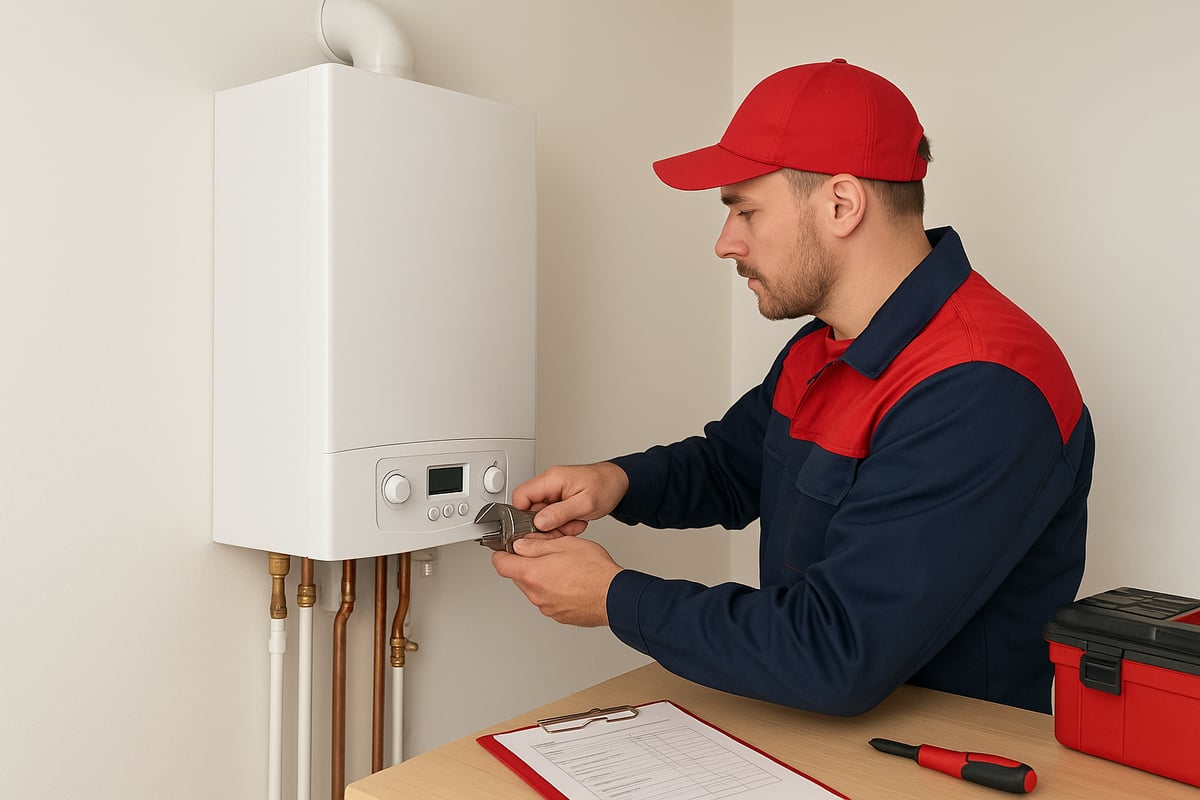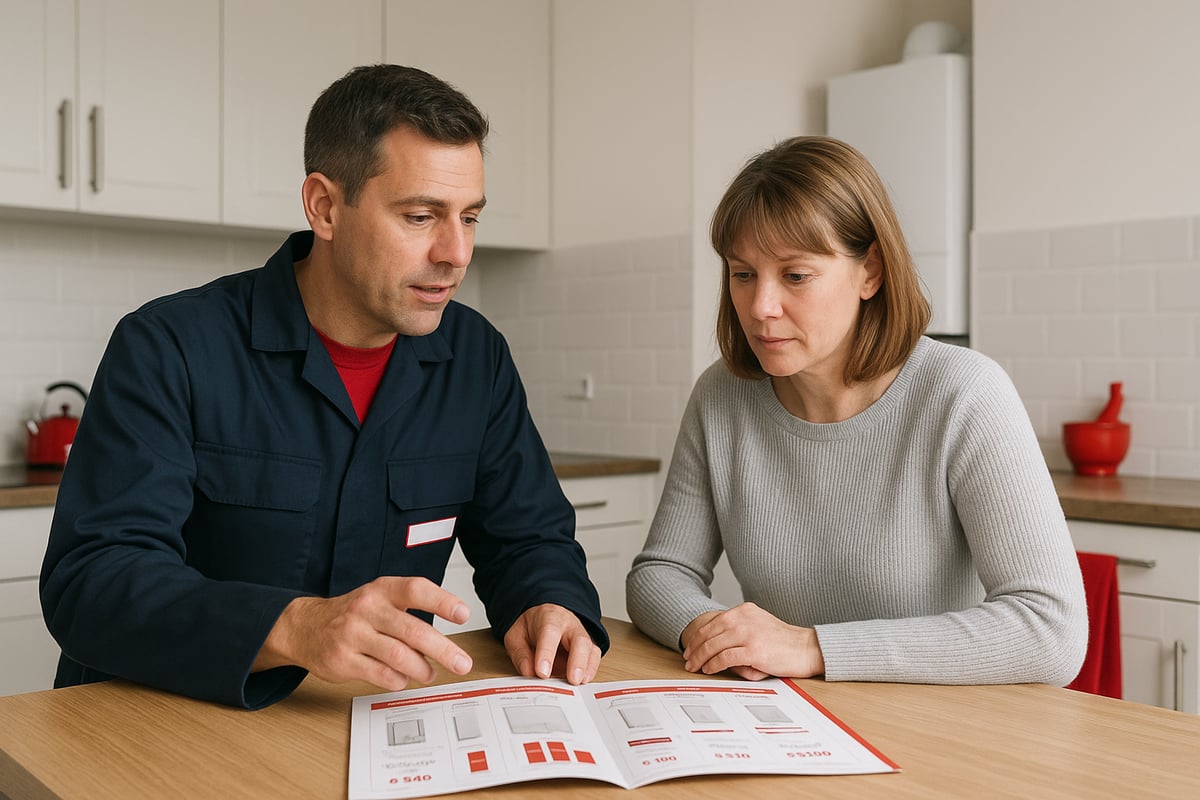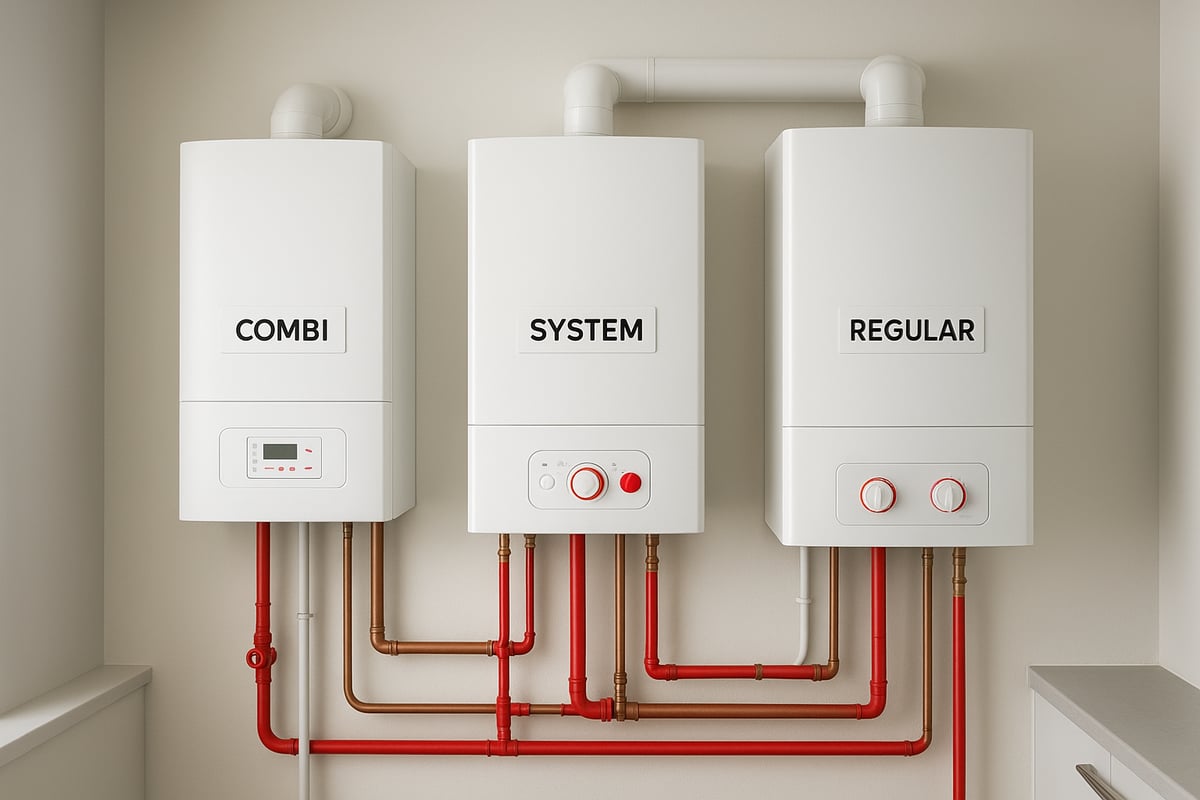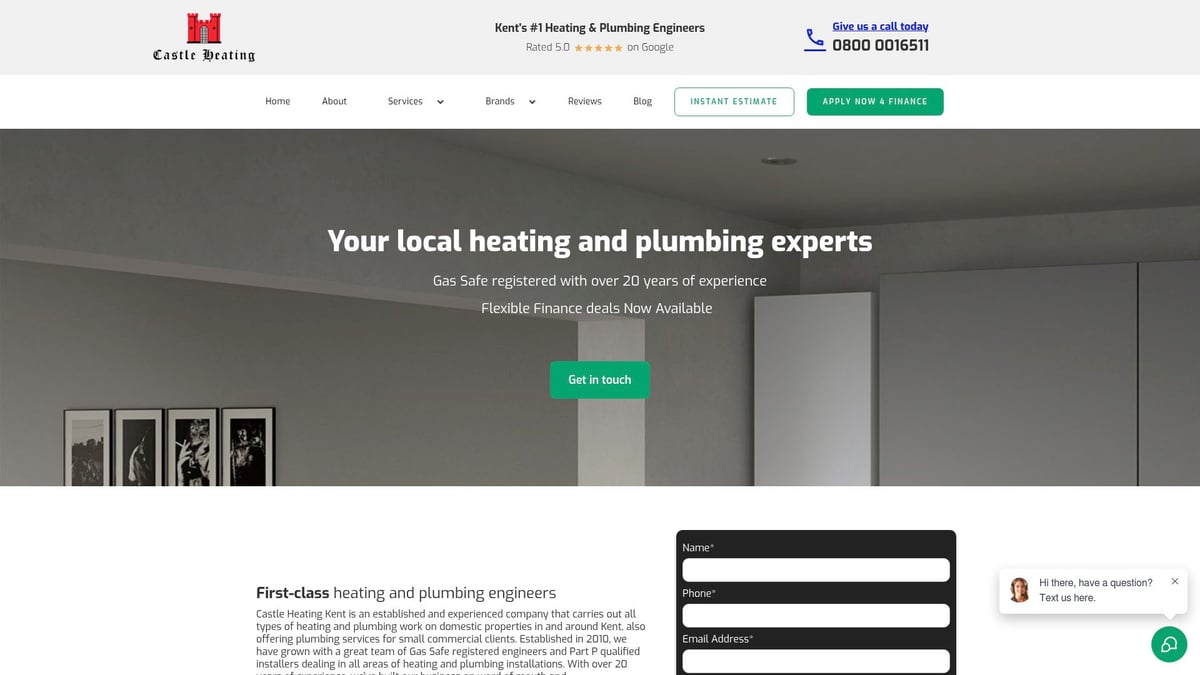Replacement Boiler Cost Guide 2025: What Homeowners Should Know
With energy prices continuing to climb and new heating regulations approaching, UK homeowners are looking ahead to the challenges of 2025. The question on many minds is how much a replacement boiler cost will impact household budgets in the coming year.
This guide provides a clear, practical overview of what to expect if you are thinking about replacing your boiler. We break down the replacement boiler cost, outline the main factors affecting pricing, and offer tips to help you make a smart, cost-effective choice.
From average prices to hidden fees, money-saving strategies, and how to choose the right installer, you will find everything you need to navigate the process confidently. Read on to take control of your heating upgrade and save money in 2025.
The True Cost of a Replacement Boiler in 2025
Understanding the true replacement boiler cost in 2025 is vital for UK homeowners planning to upgrade their heating system. With prices shifting and new regulations coming in, getting a clear picture of what you'll pay—and why—can help you budget wisely and avoid surprises.

Average Boiler Replacement Costs
In 2025, the average replacement boiler cost in the UK depends on the type of boiler you choose. For a combi boiler, expect to pay between £2,500 and £4,500. System boilers generally cost from £2,800 to £5,000, while regular (conventional) boilers can range from £3,000 to £5,500, depending on your needs.
Prices fall into three main brackets:
- Budget models: £2,500–£3,000
- Mid-range options: £3,000–£4,000
- Premium brands: £4,000–£5,500
For a typical 3-bedroom home, the total replacement boiler cost usually sits around £3,000–£4,500, including installation. These figures often cover the boiler itself, fitting, and basic controls, but always check what’s included.
Here’s a quick comparison table for 2025:
| Boiler Type | Budget | Mid-range | Premium |
|---|---|---|---|
| Combi | £2,500 | £3,500 | £4,500 |
| System | £2,800 | £3,900 | £5,000 |
| Regular | £3,000 | £4,200 | £5,500 |
Keep in mind, your final replacement boiler cost will depend on your specific home and installation needs.
What’s Included in a Boiler Replacement Quote?
When comparing quotes, it’s important to understand what’s covered in your replacement boiler cost. A comprehensive quote should typically include:
- The boiler unit itself
- Labour and installation fees
- Removal and safe disposal of your old boiler
- System flush and cleaning
- Standard controls (like a basic thermostat)
- Manufacturer’s warranty
Some installers may offer “barebones” quotes that initially seem cheaper but exclude essentials like pipework upgrades or system cleaning. Always check for hidden exclusions—if a quote is missing a system flush or proper controls, you could face additional costs later.
A good quote provides clarity and peace of mind. Ask for a detailed breakdown so you know exactly what your replacement boiler cost covers. Comparing like-for-like quotes ensures you avoid nasty surprises and helps you budget more effectively.
Hidden and Additional Costs to Watch For
The headline replacement boiler cost rarely tells the whole story. Depending on your property and requirements, you may face extra charges, such as:
- Upgrading outdated pipework or radiators
- Relocating the boiler to a new spot
- Installing a smart thermostat or advanced controls
- Extending flue or plume kits to meet regulations
- Building regulations sign-off and Gas Safe certification
For example, if you need to move your boiler or upgrade old pipes, the project could cost an extra £500–£1,000. Always ask your installer about potential add-ons before work begins.
Factoring in these hidden costs upfront will help you avoid budget overruns. It’s wise to set aside a contingency fund when planning your replacement boiler cost.
Regional Price Variations Across the UK
Replacement boiler cost can vary widely depending on where you live. In London and the South East, prices are often higher due to increased labour rates and greater demand. In contrast, regions like the North of England or Scotland usually see lower installation fees and sometimes reduced material costs.
For example, replacing a boiler in Kent might cost £3,800, while the same job in Manchester could be closer to £3,200. Local availability of Gas Safe engineers and supply chain factors also play a role.
If you want to see detailed figures for your postcode, check out the Boiler Replacement Cost Data by Region. Comparing regional averages helps you understand if your quote is fair and competitive for your area.
Always consider these regional differences when planning your replacement boiler cost, as they can have a significant impact on your final bill.
Key Factors Influencing Replacement Boiler Costs
Understanding what shapes your replacement boiler cost is crucial for making a smart, budget-friendly decision. Let’s break down the main factors that will affect your final price tag in 2025.

Boiler Type and Size
The type and size of boiler you choose is one of the biggest influences on your replacement boiler cost. In the UK, most homes use combi, system, or regular boilers. Each suits different property needs and budgets.
Combi boilers are compact and ideal for smaller homes with one bathroom. System boilers work well for larger homes and higher hot water demand. Regular boilers are best for older homes with existing tanks.
| Boiler Type | Typical Property | Size Range (kW) | Cost Range (2025) |
|---|---|---|---|
| Combi | Flats, 2-3 beds | 24-30 | £2,500–£4,500 |
| System | 3-5 beds | 28-35 | £2,800–£5,000 |
| Regular | Period homes | 18-40 | £3,000–£5,500 |
Choosing a 24kW combi for a small flat will keep your replacement boiler cost lower, while a 35kW system or regular boiler in a large house will push the price up. Always match the boiler output to your home’s size and hot water needs to avoid overspending.
Brand and Model Selection
The brand and model you pick has a direct impact on your replacement boiler cost. Leading names like Worcester Bosch, Vaillant, and Baxi often come with a higher price, but you also get longer warranties and proven reliability.
Budget brands can keep costs down, although they may offer shorter guarantees. Premium models feature smart controls and extra efficiency, but they add to the initial outlay.
Think carefully about warranty length and aftersales support. Sometimes, paying a little more upfront can save money in repairs later.
Complexity of Installation
How easy is your installation? If it’s a straightforward swap—replacing an old combi with a new one in the same location—your replacement boiler cost will be lower.
However, if you need a system conversion, such as switching from a regular to a combi, or relocating the boiler to a new room, expect higher labour and material fees. Additional pipework or installing in a loft can add complexity and cost.
For example, moving a boiler to a different floor may increase your overall bill due to extra work needed for safe installation.
Energy Efficiency and New Regulations
In 2025, new rules are set to change the boiler landscape. All new boilers must meet stricter efficiency standards, and many homeowners are considering hydrogen-ready or low carbon options.
These newer models often come with a higher replacement boiler cost upfront, but they can offer better energy savings and future-proof your home. For a detailed guide on eco-friendly choices and how regulations affect your options, see How to choose an eco-friendly boiler.
Investing in an efficient boiler now can help you stay ahead of the curve and avoid costly upgrades down the line.
Time of Year and Emergency Replacements
When you schedule your replacement also matters. Boiler prices often spike in winter, when demand is highest. Emergency replacements, especially during cold snaps, can come with premium charges and limited installer availability.
To keep your replacement boiler cost down, plan ahead and book your installation in the warmer months. You’ll have more choice and may even secure off-peak discounts.
Optional Extras and Upgrades
There are plenty of extras that can push up your replacement boiler cost. Popular add-ons include:
- Smart thermostats and controls
- Magnetic filters for system protection
- Extended manufacturer warranties
- Powerflushing to clean your heating system
While these upgrades can add value and efficiency, always weigh the benefits against your budget before making a final decision.
Types of Replacement Boilers: Pros, Cons, and Cost Breakdown
Choosing the right boiler can feel like navigating a maze, especially with the evolving technology and regulations in 2025. Understanding each type and the impact on your replacement boiler cost helps you make a confident, informed choice.

Combi Boilers
Combi boilers are the most popular choice for UK homes in 2025. They heat water directly from the mains, providing instant hot water without needing a separate cylinder or tank. This simplicity often results in a lower replacement boiler cost, especially for smaller properties.
Typical Cost Range:
- Budget models: £2,500–£3,000
- Mid-range: £3,000–£4,000
- Premium: £4,000–£4,500
For a two-bedroom flat, the average replacement boiler cost for a combi is around £2,800–£3,500, including installation and disposal of the old unit. For a detailed breakdown, check out Combi boiler replacement prices.
Pros:
- Space-saving design
- Lower install cost
- Instant hot water
Cons:
- Not ideal for homes with multiple bathrooms
- Less effective for high hot water demand
Combi boilers are a smart option if your replacement boiler cost budget is tight and your property is modest in size.
System Boilers
System boilers are best for homes with higher hot water demands, such as those with multiple bathrooms. They use a separate hot water cylinder, but unlike regular boilers, they do not require a loft tank. This setup can increase the replacement boiler cost due to extra components and installation time.
Typical Cost Range:
- Budget: £2,800–£3,300
- Mid-range: £3,300–£4,300
- Premium: £4,300–£5,000
A four-bedroom house might expect a system replacement boiler cost of £3,500–£4,500, covering both the boiler and the hot water cylinder.
Pros:
- Great for larger homes
- Hot water for multiple taps simultaneously
Cons:
- Requires more space for the cylinder
- Slightly higher installation cost
If your family often uses several showers at once, a system boiler could balance comfort and replacement boiler cost.
Regular (Conventional) Boilers
Regular boilers, sometimes called conventional or heat-only boilers, are typically found in older UK homes. They need both a hot water cylinder and cold water tanks, making the installation more complex and often increasing the replacement boiler cost.
Typical Cost Range:
- Budget: £3,000–£3,500
- Mid-range: £3,500–£4,500
- Premium: £4,500–£5,500
Replacing a regular boiler in a period property can cost between £3,500 and £5,000, depending on access, pipework, and system upgrades.
Pros:
- Compatible with older radiators and systems
- Suitable for low water pressure areas
Cons:
- Takes up more space
- Higher installation complexity and cost
For those in traditional homes, the replacement boiler cost for a regular system is often justified by compatibility and reliability.
Low Carbon and Hydrogen-Ready Boilers
With new regulations in 2025, low carbon and hydrogen-ready boilers are gaining traction. They meet stricter efficiency standards and help future-proof your investment, though the replacement boiler cost is often higher upfront.
Typical Cost Range:
- Hydrogen-ready: £3,500–£6,000
- Low carbon models: £4,000–£7,000
Government incentives can help offset some of the replacement boiler cost, but expect to pay a premium for cutting-edge technology.
Pros:
- Lower long-term energy bills
- Environmentally friendly and future-proof
Cons:
- Higher initial investment
- Limited availability in some areas
If you want to prepare for the future, investing in a low carbon or hydrogen-ready boiler could be a wise replacement boiler cost decision.
How to Save Money on Your Boiler Replacement
Looking to reduce your replacement boiler cost in 2025? With careful planning and a little research, UK homeowners can save hundreds or even thousands of pounds on this major investment. Here’s your step-by-step guide to making smart choices and keeping your budget in check.
Comparing Quotes and Installers
Start by gathering at least three written quotes before deciding on a new boiler. This approach gives you a clear view of the replacement boiler cost landscape and helps you spot both bargains and overpriced offers.
Look for detailed breakdowns in each quote. Make sure the price includes the boiler unit, installation, removal of the old system, and any extras like thermostats or smart controls. Watch out for barebones quotes that seem cheap but leave out essentials, leading to surprise bills later.
Ask questions about labour rates, warranties, and aftercare. Comparing multiple local installers often reveals significant price differences, sometimes saving you £500 or more. For a deeper look at current pricing trends and what’s included, check out the New Boiler Prices in 2025: What Homeowners Need to Know for up-to-date insights.
A little homework on your replacement boiler cost pays off quickly and can help you avoid costly mistakes.
Finance Options and Government Grants
Don’t let the upfront replacement boiler cost put you off. In 2025, several finance options and grants are available to lighten the financial load. The Boiler Upgrade Scheme offers government-backed support for homeowners switching to low-carbon heating, potentially saving you thousands.
Check your eligibility for the Green Homes Grant or local council incentives. These schemes often cover part of the installation cost, making energy-efficient upgrades more affordable. Many installers also provide interest-free or low-interest payment plans, allowing you to spread the replacement boiler cost over manageable monthly payments.
To see how many UK homeowners are benefiting from these incentives, review the latest Boiler Upgrade Scheme statistics: May 2025. Taking advantage of these programmes can significantly reduce your total spend and make a new boiler more accessible.
Choosing the Right Time to Replace
Timing matters when it comes to your replacement boiler cost. Most homeowners wait until winter, but this is when installers are busiest and prices are at their highest. If possible, plan your installation for spring or summer, when demand drops and you’re more likely to secure discounts.
Emergency replacements often come with premium charges, especially during cold snaps. By anticipating when your boiler might need replacing, you can avoid these last-minute expenses and schedule the work at a convenient, cost-effective time.
A little forward planning can make a big difference to your overall replacement boiler cost and ensure you’re not left without heating when you need it most.
Maintenance and Warranty Considerations
Long-term savings on your replacement boiler cost don’t end once installation is complete. Investing in an extended warranty and regular servicing helps prevent costly breakdowns and keeps your system running efficiently.
Annual maintenance checks catch small issues before they turn into expensive repairs. This not only extends the life of your boiler but also protects your warranty. For more on what ongoing care involves and typical pricing, see this helpful Boiler service UK cost guide.
Well-maintained boilers are less likely to suffer major faults, helping you avoid unexpected costs and maintain a lower overall replacement boiler cost for years to come.
Energy Efficiency Savings
Upgrading to an A-rated boiler can slash your energy bills, offering a real return on your replacement boiler cost. New models are far more efficient than those installed a decade ago, often delivering annual savings of £300 to £500 for a typical UK household.
Calculate the payback period by dividing your expected yearly savings by the initial replacement boiler cost. In many cases, the investment pays for itself in just a few years, especially when combined with grants or seasonal discounts.
Choosing the most energy-efficient option means you’ll enjoy lower bills, a warmer home, and peace of mind that your replacement boiler cost is working hard for you.
Selecting a Qualified Boiler Installer in 2025
Choosing a qualified installer is crucial for keeping your replacement boiler cost under control and ensuring a safe, reliable system. With 2025 bringing stricter standards, it pays to be thorough when selecting the right professional for the job.
Essential Qualifications and Accreditations
The first step in managing your replacement boiler cost is to check that your installer holds the right qualifications. Every installer must be Gas Safe registered, which is a legal requirement for anyone working on gas appliances in the UK. Many top brands, like Worcester Bosch and Vaillant, also require you to use manufacturer-approved installers to keep your warranty valid.
For a deeper understanding of why these qualifications matter, read Why you need to hire accredited installers. This ensures your replacement boiler cost does not spiral due to non-compliance or voided warranties.
Local vs. National Companies: Pros and Cons
When comparing installers, you’ll notice differences between local firms and national chains. Local companies often provide more personalised service and may offer better aftercare, which can help you avoid unexpected spikes in your replacement boiler cost. National companies might have faster response times or more financing options, but sometimes at a higher price.
| Feature | Local Installers | National Companies |
|---|---|---|
| Price | Often lower | Sometimes higher |
| Service | Personalised | Standardised |
| Response Time | Varies | Often faster |
| Aftercare | Strong local focus | Centralised |
Thinking about your priorities and budget will help you decide which route offers the best value for your replacement boiler cost.
Checking Reviews, References, and Guarantees
Never underestimate the power of customer reviews when evaluating your replacement boiler cost investment. Look for verified feedback on platforms like Google, Trustpilot, and Which? Trusted Traders. Ask for references from recent customers and clarify what guarantees and aftersales support are included in the quoted replacement boiler cost.
A reputable installer will be transparent about their work, provide proof of insurance, and explain their guarantee policy. This extra diligence helps you avoid expensive surprises after installation.
Castle Heating Kent: Local, Trusted Boiler Experts in Kent
If you live in Kent, Castle Heating Kent stands out as a top choice for managing your replacement boiler cost. With over 20 years’ experience, they serve Rochester, Gravesend, Maidstone, and Gillingham. As Gas Safe registered and Which? Trusted Traders, they offer transparent pricing and instant online estimates.

You’ll benefit from flexible finance options and a customer-first approach, including 24/7 emergency callouts. Their five-star reputation and commitment to quality make them a smart pick for your next replacement boiler cost project.
Questions to Ask Before Hiring
Before making a final decision, prepare a checklist to avoid any surprises in your replacement boiler cost:
- What exactly is included in the quote?
- How long will the installation take?
- Are there any hidden fees or extra charges?
- What aftercare, servicing, and warranty are provided?
- Can you provide recent references and proof of qualifications?
Asking these questions ensures your replacement boiler cost stays predictable and your new system delivers peace of mind.
Now that you’ve got a clearer picture of replacement boiler costs in 2025 and what affects your budget, the next step is finding someone you can trust to guide you through it. With over 20 years’ experience and a friendly team of Gas Safe engineers, Castle Heating Kent makes the process straightforward, whether you’re in Rochester, Gravesend or anywhere nearby. You’ll get transparent pricing, honest advice and flexible finance options—plus, they’re always on hand if you need help in a hurry. If you’re ready to chat about your options or want a no obligation estimate, Call Now on 01634790511 or 0800 0016511.

